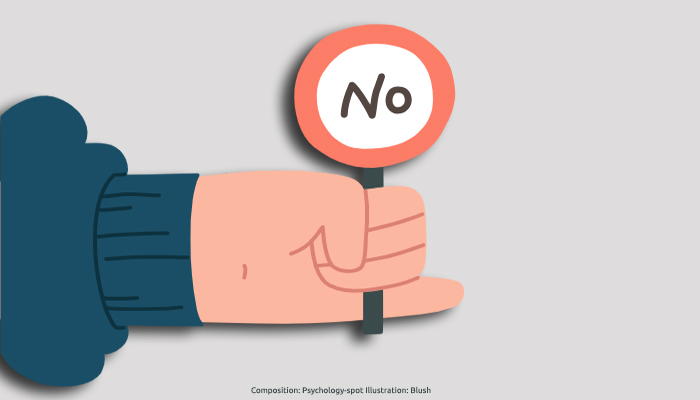
Someone asks you something and you say yes, maybe not immediately, but you end up giving up, even if you don’t really want to. However, as soon as “yes” comes out of your mouth, something inside you gets blocked. You start thinking about everything that this new commitment or responsibility will entail. Maybe you remember the last time you helped that person and he didn’t appreciate what you did for him. Or come to your mind the personal problems that represented for you offering that help.
Then your brain starts to make excuses, while you fervently wish it was not too late to back out. But as you have already given your word, you reconsider, avoid thinking of the excuses and decide that you will help him. For the last time. Again. And so over and over again.
If this scenario is familiar and repeats itself more and more in your life, to the point of feeling used and manipulated, you probably need to set limits. If you don’t do it, you will end up overloaded, saturated with tasks and responsibilities that probably do not correspond to you and generate a great burden and stress.
Why do I say yes when I want to say no?
– You do for others what you would like them to do for you. If you are always willing to help others, even when that help represents a heavy burden for you, it is likely that you will be moved by a deep sense of duty. You show available because you expect the others to do the same, because you’ve been taught that self-sacrifice is a positive value we should all put into practice. The problem is that many people will not be willing to do the same for you, and will probably take advantage of that kindness.
– You want to fulfill the given word. It is likely that you are a responsible person, so once you commit to something, you carry it out. Perhaps you didn’t value what the demand meant and you rushed to answer, but as you think it isn’t correct to change your mind withdrawing the given help, you go ahead, even if it means a great sacrifice for you.
– You fear losing that person. If you always say yes when you want to say no, it is likely that in the background you are motivated by the fear of loss. You don’t establish limits because you fear that person will reject or abandon you if you don’t give in to his demands or are not at his disposal. In that case, it’s likely that you are one step away from suffering the doormat effect.
– You don’t want others to think badly about you. Sometimes, you are likely to give in to the pressures of others because you want to avoid the shock wave that your refusal might cause. For example, if you refuse to help a friend, you are worried about what the rest of your friends will think of you and if you refuse to help a family member, you are worried about the reaction of the rest of your family.
– You suffer the Savior Complex. In this case, you are likely to feel an urgent need to “save”, “care” or “help” other people, even at the cost of sacrificing your needs. This behavior is based on the belief that those who give themselves to to others are better. Therefore, these are people who try to prop up their identity by giving themselves to the others.
– You don’t appreciate yourself enough. If you say yes continuously when you want to say no, putting the needs of the others before yours, it’s likely that you have a problem of self-esteem. If you don’t appreciate yourself enough, if you don’t value your time and energy, you will be more prone to yield to the demands of those around you, since you consider that their needs and desires are more important and valuable than yours.
The dangers of saying yes when you want to say no
– Resentment. One of the main consequences of not putting limits is that you will end up yielding to the pressures of the others and then, when things don’t go well, you will feel resentful. You’re likely to end up feeling angry, frustrated and upset because you have put yourself under a lot of pressure and maybe you have not even received the proper recognition.
– Deterioration of the relationship. When a person continually asks and you give in is established an imbalance of power in which you are the loser. It’s not strange that these relationships end up suffering or even breaking, because it is probable that you blame that person for your unhappiness and end up unloading those frustrations on him. A situation that could have been avoided by establishing healthy limits from the beginning.
– Dissatisfaction and stress. Continuously giving in to the demands of the others leads to a great deal of stress. These new commitments and responsibilities add additional tension, which will end up generating a deep personal dissatisfaction since your needs will remain unsatisfied. From so much caring of the others you will forget yourself.
Learn to say “no” assertively
Brené Brown, a social worker who spent a decade studying shame, vulnerability and compassion, made an amazing discovery: the most compassionate people are also those who have the most limits. This defeats the popular belief that compassionate people are those who are always willing to help and draws a different psychological profile.
Brown states that “the sustainability of giving and loving without being resentful and bitter can come only with a feeling of personal abundance. And personal abundance will not exist without boundaries.
he heart of compassion is really acceptance. The better we are at accepting ourselves and others, the more compassionate we become.
Well, it’s difficult to accept people when they are hurting us or taking advantage of us or walking all over us. This research has taught me that if we really want to practice compassion, we have to start by setting boundaries and holding people accountable for their behavior.”
In his speech there are several important points that we must make to learn to say “no”:
– Assume that setting boundaries does not mean being rude, aggressive, selfish or insensitive. Setting boundaries is, in the end, an act of self-pity and self-determination because it implies being aware of our needs and rights. We must understand that love and respect for the others begin with self-respect and self-love.
– Set boundaries. Maybe you assume certain commitments and responsibilities because you are not aware of your limits, you think you can do everything, that you can do your part and that of the others, although you can’t. To avoid this “calculation error”, before setting boundaries in your relationship with the others, you must set boundaries to yourself. Those limits will allow you avoid behaviors that harm you, so that you don’t cross the line demanding too much to yourself. Be honest with yourself and determine what you can and can’t do, and also what you don’t want to do.
– Be aware of your needs. You have as much right to satisfy your needs as the others, which means that you should not allow them to dictate what you can do with your time and your energies. Prioritizing yourself is not a sin. Based on your needs, determine how much, how, where and to what extent you can help.
– Take some time to reflect. To learn to say no you don’t need to take a step back. Establishing a psychological distance will allow you to weigh the pros and cons of the commitment you are about to make. Therefore, when someone asks you for something that demands a big commitment, don’t answer immediately, tell him you need more time to reflect on the matter. This way you will not set a trap to yurself and, if you decide you can’t do what he’s asking you, you won’t have pledged your word.
– Focus on what you’re renouncing to. It is very difficult to stand firm in the boundaries you have established when a part of you thinks that helping that person is the “right thing”, when a part of you is telling you that you are a “bad person” because you think only of yourself. To counteract this thought you need to focus on what you’ll have to sacrifice, on the things that you will have to renounce by saying “yes”.
– “Helping” does not always helps. Facilitating the life to the others is not always helping. Sometimes we think that saving problems, difficulties and conflicts to the others is positive and it is “right”, but in this way we could also be taking away of them opportunities for growth. By preventing that person from facing the problems of life, you may also be preventing him from developing his resilience.
The key lies in balance. In being aware that there is a time to say yes and another to say no. The philosopher Ayn Rand reminds us that “The principle that one should help men in an emergency cannot be extended to regard all human suffering as an emergency and to turn the misfortune of some into a first mortgage on the lives of others.“
Source:
Brown, B. (2012) Daring Greatly: How the Courage to Be Vulnerable Transforms the Way We Live, Love, Parent, and Lead. Nueva York: Gotham.



